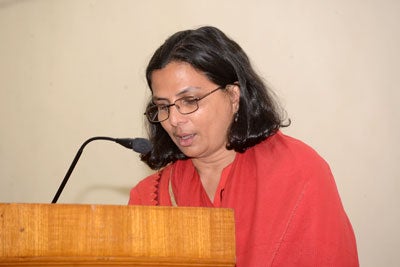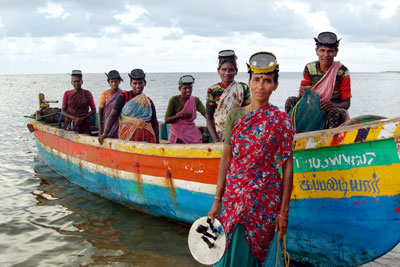“Women play a crucial role in marine environments and fisheries economies” – gender and development expert
Date:

Mariette Correa is a gender and development expert, with a doctorate in development studies. She is currently the Senior Programme Coordinator with International Collective in Support of Fishworkers. (ICSF). ICSF is an international network of social activists for equitable, gender-just, self-reliant and sustainable fisheries, coordinated by a Secretariat based in India. At a recent event organized by UN Women in Seychelles on Women’s Economic Empowerment in the Indian Ocean Rim Association, Ms. Correa gave a presentation on securing sustainable small-scale fisheries as a critical strategy in women’s economic empowerment.
Describe the importance of women's roles in marine environments and ocean economies.
Women play a crucial role in marine environments and fisheries economies, specifically in the small-scale and artisanal fisheries sector, though their contribution is still invisible and unacknowledged. They represent half of the total working population worldwide in the seafood industry as a whole, with fisheries, aquaculture, seafood processing and all related services. Women also play a large role in inland fisheries, which is an important sector for food security. Women's activities, paid and unpaid, include the full range along the value chain, as well as pre- and post-harvest activities. This includes seaweed and shellfish collection, fishing, weaving and repairing nets, processing, sales, and local and intra-regional trade.
Women in small-scale fisheries also play key roles in managing finances at the household level and managing aquatic resources at the community level. This does not necessarily translate to decision-making power for women, as these roles are generally ignored and undervalued. Women in indigenous and local coastal communities have extensive local and traditional ecological knowledge, which contributes towards the sustainable use and conservation of marine and coastal ecosystems.

What challenges do women in particular face in the marine/fishing industry, in terms of access to resources, participation in decision-making bodies, etc.?
Women in the small-scale and artisanal fisheries sector have difficulty securing their rights as workers because their role is often unrecognized. They have limited or no access to social security, capital and credit, and face hardships in securing land rights and access to fishery resources. They also face unsafe, unhygienic, and unfair working conditions. In most places, women in post-harvest activities are constantly struggling for even basic facilities at landing centres and markets. The lack of capital accessible to women in small-scale fisheries means a lack of resources to buy necessary equipment for storing fish, maintaining quality and freshness, which results in less control over markets. Globalization, privatization as well as pollution and climate change have led to declining access to fish for processing and marketing.
In the workplace and at the community and household level women are exposed to abuse, and in some cases, transactional sex (fish for sex). In small-scale fishing communities in general, and for women in particular, access to education, healthcare and sanitation are severely compromised. Women affected by disasters are particularly vulnerable. Their knowledge is hardly recognized, though they have valuable ideas on how to improve the sustainable use of marine resources. Women are poorly represented in decision-making spaces and leadership roles in fisheries.
In your experience with the Women Fish Vendors in Mumbai programme, how has unionization helped women fish workers secure greater protection and rights?
In 2014, the women's wing of the Maharashtra Macchimar Kruti Samittee, a trade union which has been pushing for women fish vendors’ rights, took an important first step towards having a greater say in the city’s development by getting the Municipal Corporation of Greater Mumbai to agree to a joint exercise mapping the city’s formal and informal fish markets. Along with other organizations, the women fish workers of Mumbai used this mapping study and photographic evidence to prevent the eviction of a fish market. Exposure trips organized by ICSF also helped the women fish vendors of Maharashtra to understand the function and importance of cooperatives, especially in access to markets and credit.
In what ways do fish harvesting policies place women at a disadvantage?
Fish harvesting policies often focus on industrialization and centralization of facilities in urban areas. In many countries, this has meant that women were marginalized or even pushed out of the sector. Infrastructure development, capacity-building and marketing practices (both informal and formal) of the sector at village-level, in which women play a key role, have also been neglected.
What is being done at an international level to address such problems?
In 2010 ICSF facilitated an international agreement, dubbed the “Shared Gender Agenda for Sustaining Life and Livelihoods in Fishing Communities”, adopted by a broad network of women in fisheries organizations, academics, practitioners, social activists and other civil society organizations. This Shared Agenda was used to incorporate gender concerns in the Voluntary Guidelines for Securing Sustainable Small-scale Fisheries in the Context of Food Security and Poverty Eradication adopted by the Food and Agriculture Organization in 2014 and also in the Voluntary Guidelines on the Responsible Governance of Tenure of Land, Fisheries and Forests (2012). These guidelines recognize the vital role of women in small-scale fisheries and that achieving gender equality is of fundamental importance for sustainable fisheries.
It is imperative that these guidelines are now implemented, providing an opportunity for women to secure tenure rights, equal participation in decision-making processes, protection from discrimination, and spaces for women fish workers and their organizations to participate in the monitoring of their implementation.